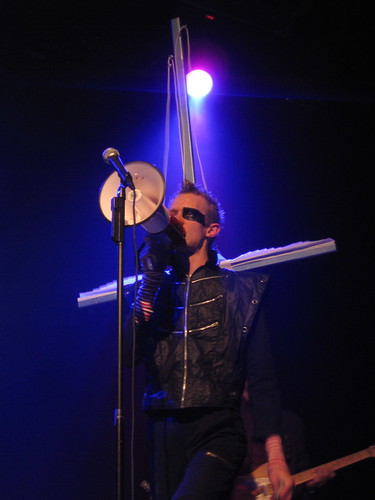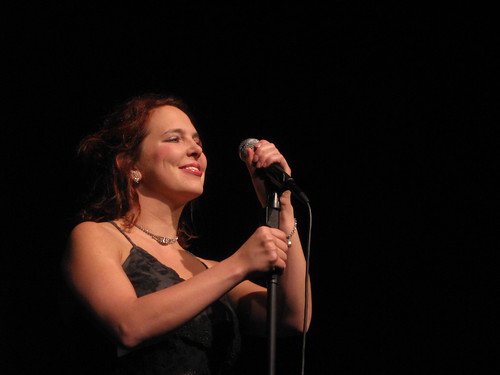 Well, it looks like my new blogging pattern is to pop in here every 3-4 months, when I feel like I have a unique insight or bit of information to share, because, hey, I've contributed enough to the noise of the internet, and I'd like to kick in with some signal here and there when I can.
Well, it looks like my new blogging pattern is to pop in here every 3-4 months, when I feel like I have a unique insight or bit of information to share, because, hey, I've contributed enough to the noise of the internet, and I'd like to kick in with some signal here and there when I can.Today I want to jot down a few thoughts about photography, to share a few tips I've learned, and maybe demystify the process a little for others who are thinking about doing similar things.
Over the last few years I've shot roughly a bajillion photos, mostly of people performing at comedy shows, literary readings, storytelling events, and other similar events. To date, dozens of my photos have been used in newspapers and magazines, promotional materials, and even movies. (Yeah, really!)
None of this is because I'm some brilliant photographer with a $2,000 camera and inside-out knowledge of technical things. I asked my friend Jenny, who does photography for a living, for some tips once, and she explained that good photography is a mix of three important factors, and I can never remember what they are. (Okay, I just Googled it, and those three things are ISO, aperture, and shutter speed.) Point is, I've managed to take lots of nice, useful photos because of the prudent use of two of my camera's features: the burst setting and the TV setting.
 The burst setting simply means shooting lots of photos in rapid succession - one each few seconds. On my camera, the TV setting controls shutter speed, which is helpful when shooting in low-light situations. I bring the TV setting down as low as I can (to let in as much light as possible) without it being so low that the images are blurry.
The burst setting simply means shooting lots of photos in rapid succession - one each few seconds. On my camera, the TV setting controls shutter speed, which is helpful when shooting in low-light situations. I bring the TV setting down as low as I can (to let in as much light as possible) without it being so low that the images are blurry.Of course, shooting hundreds (or thousands) of photos of a single event means a much greater chance of taking lots of nice photos, but also a lot of editing. Again, I use the simplest thing most easily available to me - iPhoto. I use it to review and pare down the photos, and perform very basic lightness/darkness and/or color correction.
You need to get really instinctive and make quick decisions as you pore over your photos. I tend to work like this: round one of editing photos is clicking quickly through every single photo, one at a time, and deleting the ones that are fuzzy or blank or otherwise bad. Then the next round I pare it down further, deleting lesser-quality shots and redundant shots, with an eye toward ending up with 4-5 really good shots of each scene/frame. More than that is unnecessary, unless you're shooting something like headshots, when you'd like to give your subject as many nice shots to choose from as possible.
My camera is not brand-new, super fancy or expensive. It's a Canon PowerShot A590IS - 3+ years old, about $100. When I bought it, I immediately got such great results with both photos and video that three of my friends bought the same camera, and they all love it as much as I do.
 The big theme I'd like to touch on here is that all you need to know about a particular tool (camera, editing software, box of paints, whatever you need to use to create your final product, whether it be a set of photos or a video or a vase) is whatever you need to do the specific thing you want to do.
The big theme I'd like to touch on here is that all you need to know about a particular tool (camera, editing software, box of paints, whatever you need to use to create your final product, whether it be a set of photos or a video or a vase) is whatever you need to do the specific thing you want to do.I used to feel overwhelmed examining all the things my camera could do; all the settings, modes, levels, blah blah freaked me out, not to mention all the fancy things trained people can do with Photoshop. All I have on my Mac at the moment is iPhoto, but you know what? That's all I need. I'm not trying to become a formal portrait photographer, or a commercial photographer. I just want to take nice pictures at comedy shows in Chicago, so I figured out just enough to do exactly that.
Above all, don't let your inhibitions about learning a new skill stop you from proceeding. Do what you want to do, and have fun.

2 comments:
I had no idea that you did not have a super schmancy camera! You make it look easy. :)
Thanks! I should have also mentioned I use no flash and I stay in one place (usually a seat in the front row). Oftentimes people don't even realize I'm taking pictures.
Post a Comment